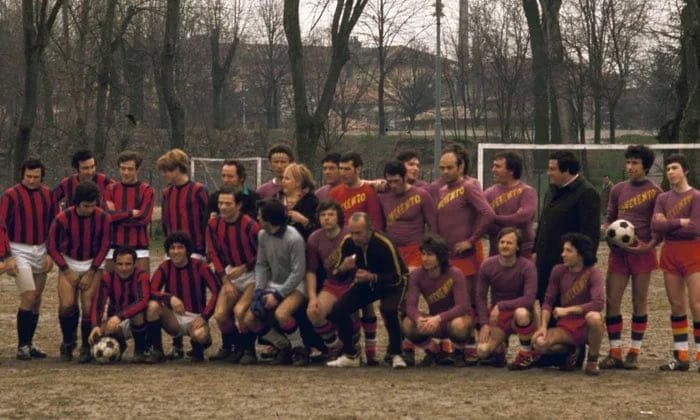IL TRUCE

Novecento v Salò
The stakes surrounding the football match between Bernardo Bertolucci’s cast and crew and Pasolini’s weren’t quite as high as the historic game between German and British soldiers during the Christmas Truce of 1914, but the general concept remained much the same. The two Italian filmmakers had fallen out over Pasolini’s public criticism of Bertolucci’s Last Tango in Paris (1972). Pasolini had been a mentor to Bertolucci earlier in his career, and his negative comments had wounded him on both a personal and professional level.
Then, thanks to a mutual actor friend, Laura Betti, it was suggested that, as both directors were working with the same production company on their current films, Novecento and Salò, a friendly football “truce match” should be arranged to clear the air and settle the score between the two men. Both films were being shot within a few miles of one another in Parma, and so, in the spring of 1975, a game was organised as a gesture of reconciliation. With an early 9:30 a.m. kickoff and cars parked all around the pitch at the Cittadella, the two teams went to battle.
“Salò played in the blue and red stripes of Pasolini’s beloved Bologna, whose players had been among the protagonists of his documentary Love Meetings. Designed by the film’s wardrobe manager, Novecento played in bright purple shirts with the name of the film splashed across their chests in yellow letters. They wore multicoloured rainbow socks. Some Super 8 footage was shot by Bertolucci’s producer wife, Clare Peploe, but never released and not seen for years. There was a cake and even a silver trophy for the winner.” — The Guardian, May 2022
Pasolini famously loved football, “the last sacred ritual,” as he called it, above all things, and considered the greatest poets of all to be the top scorers of each season (though I personally refuse to think of Newcastle’s Alan Shearer as a poet, regardless of how many goals he scored back in the day). Bertolucci was apparently far less interested in the game (either watching or playing) and decided it was better for him to stay on the sidelines as coach, while Pasolini took to the field with his men, unaware that his rival had enlisted the help of a couple of 15-year-old players from Parma’s youth squad, whom he claimed were toolmakers from his set.
It wasn’t widely known until the release of the 2019 documentary Centoventi contro Novecento, about the match, that one of those 15-year-olds was, in fact, Carlo Ancelotti, the future great player and manager, who scored the winning goal for Bertolucci's team that Spring morning and would go on to play for and win trophies with Napoli, AC Milan, Juventus, and Real Madrid.
“Gazzetta dello Sport took a photo (see above) from that day to him. Ancelotti conceded: ‘Yes, that boy is me,’ remembering it all clearly — a game without tactics and with total freedom, a joy.”
Final Score: Bertolucci's Novecento 5 – Pasolini's Salò 2
There's a small joy in thinking of Ancelotti enjoying a game free of tactical (and possibly technical) restrictions; a true artist’s approach to playing football, not dissimilar to the game I described in an earlier Digital Renegade piece I wrote, “Common People,” about a ragtag assembly of layabouts and crazies playing on Rodborough Common in Stroud, with no white lines or referees to impose boundaries on our sporting anarchy. I also like to think Pasolini would have appreciated our wild abandon in pursuit of something beyond the realms of convention that still (just about) resembled the game he so loved.

'And life is itself but a game at football.' - Sir Walter Scott
Of course, the tragic irony that arrived later that same year of 1975, nine months after the truce match, was that Pasolini was murdered by unknown assailants, his body found mutilated on a football pitch in Ostia, near Rome. Whether it was politically motivated, connected to an extortion plot, or mafia-related remains a mystery, but the thought of the director playing his truce match with Bertolucci that spring morning in March, and being found dead on a similar ground by November, is poetic in its own grim way.
Bertolucci may have found some small comfort in knowing that they had made up the way they did, in an act of human reconciliation over the game Pasolini loved with such great passion; far better to remember him that way than for the barbaric murder his mentor suffered later that year, crucified on the grassy altar of a football pitch.
